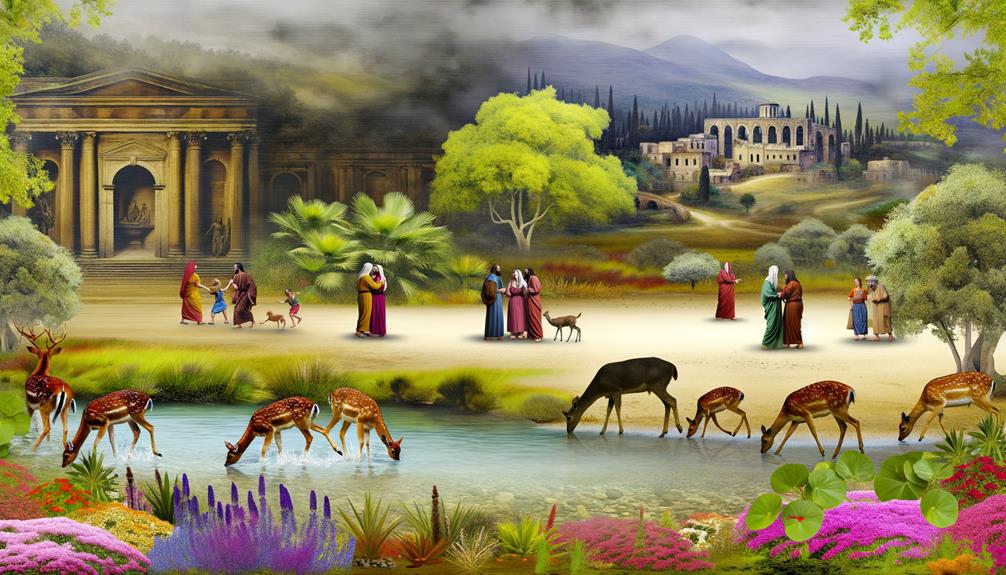As Deer Pants for the Water Bible Verse Meaning: Explained
Psalm 42:1, “As the deer pants for the water brooks, so pants my soul for You, O God,” employs vivid imagery to express profound spiritual thirst and yearning for God’s presence during a time of distress. This metaphor reflects an acute longing for the divine, akin to a deer’s need for water in an arid landscape.
Historically, it echoes the intense spiritual desolation experienced by the Israelites, possibly during Babylonian exile, emphasizing the necessity of divine communion for emotional and spiritual well-being. Further exploration reveals how this ancient plea resonates profoundly with modern spiritual seekers.

The Spiritual Meaning of ‘As the Deer Pants for the Water’: A Symbol of Spiritual Longing and Dependence on God
| Aspect | Biblical Meaning | Scriptural Significance |
|---|---|---|
| Spiritual Longing | The verse expresses a deep spiritual longing, comparing the soul’s desire for God to a deer’s thirst for water in a dry land. | Reflects the intense craving of the human soul for closeness, peace, and connection with God. |
| Dependence on God | Just as a deer depends on water for survival, this verse symbolizes the believer’s total dependence on God for spiritual sustenance and life. | Represents the recognition that true fulfillment, peace, and strength come from God alone. |
| Thirst for God’s Presence | The imagery of thirsting for water reflects a desire for the constant presence of God, yearning for communion and fellowship with Him. | Symbolizes the need to seek God’s presence in prayer, worship, and devotion. |
| Emotional and Spiritual Distress | The psalmist uses this metaphor to describe a time of emotional or spiritual distress, where the soul is yearning for relief, comfort, and reassurance from God. | Represents times of spiritual dryness or feeling distant from God, urging believers to seek His comfort and guidance. |
| Desire for Divine Connection | The deer’s longing for water mirrors the believer’s desire for a deeper connection and intimacy with God, reflecting a heart that seeks spiritual growth. | Represents the pursuit of deeper spiritual understanding and intimacy with the divine. |
| Unquenchable Desire for God | The verse highlights that no earthly things can satisfy the soul’s deepest longings, emphasizing that only God can quench this spiritual thirst. | Reflects the belief that material things cannot bring lasting satisfaction or fulfillment—only a relationship with God can. |
| Metaphor of Life’s Struggles | The image of a panting deer in search of water can also symbolize the struggles of life, where the soul feels drained and in need of renewal from God. | Represents how life’s trials can lead to deeper reliance on God for strength and endurance. |
| Encouragement to Seek God | The psalm encourages believers to seek God earnestly, especially during difficult or dry spiritual seasons, trusting that God will provide refreshment and renewal. | Reflects the call to pursue God, knowing He will meet the soul’s needs and offer renewal. |
Context of Psalm 42:1

Psalm 42:1, a poignant verse in the Hebrew Scriptures, is set within the broader context of the psalmist’s deep longing for God’s presence amidst personal turmoil.
The psalmist, traditionally attributed to the sons of Korah, articulates a profound spiritual thirst, likening it to a deer’s physical need for water. This verse opens a psalm that oscillates between expressions of despair and hope, reflecting an existential struggle intensified by feelings of divine absence.
The broader narrative suggests that the psalmist is in exile or experiencing severe distress, thereby heightening the sense of yearning for divine communion. This contextual backdrop is essential for understanding the intensity of the psalmist’s metaphorical language and the emotional depth conveyed in subsequent verses.
Imagery of the Deer

The imagery of the deer in Psalm 42:1 serves as a powerful metaphor, encapsulating the psalmist’s profound yearning for God’s presence amid their existential anguish. This vivid depiction draws upon the natural behavior of a deer, an animal known for its acute sense of need for water, especially in arid conditions.
The psalmist’s choice to liken their spiritual desperation to the deer’s physical thirst underscores the intensity and urgency of their longing. In the ancient Near Eastern context, where water represented life and sustenance, the metaphor gains additional depth.
The deer, a symbol of vulnerability and purity, effectively communicates the psalmist’s deep emotional and spiritual distress, seeking solace and rejuvenation from the divine source.
Spiritual Thirst Explained

Understanding spiritual thirst involves examining the profound inner longing for a deeper connection with the divine, which transcends mere physical needs. This yearning is often depicted in sacred texts and theological discourse, reflecting a universal human experience.
Spiritual thirst can be analyzed through various dimensions:
- Emotional aspects: Feelings of emptiness or longing.
- Intellectual pursuit: Seeking answers to existential questions.
- Moral framework: Desiring alignment with divine principles.
- Communal aspects: Engaging in shared religious practices for mutual support.
These facets underscore that spiritual thirst is not merely a desire for knowledge but a holistic quest for fulfillment that encompasses emotional, intellectual, and spiritual domains.
Recognizing this thirst can lead to a more profound understanding of one’s spiritual journey.
Longing for God’s Presence

Building on the concept of spiritual thirst, the longing for God’s presence represents an intrinsic and profound desire for a deeper communion with the divine essence.
This yearning transcends mere ritualistic practice and enters the domain of personal, intimate connection with God.
In biblical literature, this longing is often depicted as a visceral, almost physical need, akin to a deer panting for water. Such imagery underscores the intensity and necessity of divine presence in the believer’s life.
This profound desire reflects the soul’s recognition of its incompleteness without God, driving individuals to seek His nearness through prayer, meditation, and worship.
Consequently, the longing for God’s presence becomes a central tenet of spiritual life, illustrating the transformative power of divine communion.
Historical Background

Understanding the historical background of Psalm 42, from which the verse originates, is essential to comprehending its full meaning.
This psalm, attributed to the Sons of Korah, reflects the ancient worship practices and the profound yearning for God’s presence in times of distress.
Examining the cultural and liturgical context of the period provides insight into the psalmist’s metaphor of a deer longing for water as an expression of spiritual thirst.
Psalm Origin Context
The historical context of Psalm 42, from which the verse ‘As the deer pants for streams of water’ is derived, is rooted in the experiences of the Israelite community during periods of exile and spiritual longing. This Psalm, attributed to the sons of Korah, reflects deep emotional and spiritual distress. It captures the profound yearning for God’s presence during times of separation from the sacred temple worship in Jerusalem. The metaphor of the deer thirsting for water in Psalm 42 can be understood in connection with the biblical interpretation of milk and honey as symbols of abundance and sustenance. Just as the deer longs for streams of water to quench its thirst, the Israelites yearn for the spiritual nourishment and fulfillment that comes from being in God’s presence. This verse continues to resonate with believers today, serving as a reminder of our own need for God’s sustenance and the deep longing for spiritual fulfillment.
Key historical elements include:
- Babylonian Exile: Displacement and diaspora of the Jewish people.
- Temple Destruction: Loss of a central place of worship.
- Cultural Assimilation: Pressures to conform to foreign customs.
- Prophetic Voices: Calls for repentance and return to God.
Ancient Worship Practices
Ancient Israelite worship practices were deeply intertwined with their cultural identity and spiritual life, centering around rituals, sacrifices, and festivals prescribed in the Torah. Central to these practices were the Tabernacle and later the Temple, serving as focal points for communal worship and sacrificial rites.
Offerings ranged from burnt sacrifices to grain offerings, each symbolizing devotion, atonement, or thanksgiving. Festivals such as Passover, Shavuot, and Sukkot punctuated the spiritual calendar, reinforcing communal identity and collective memory.
Additionally, psalms and hymns played a key role in worship, encapsulating themes of longing, praise, and lamentation. These practices provided a structured means of engaging with the divine, fostering a sense of continuity and community among the Israelites.
Symbolism in Scripture

Scriptural symbolism often utilizes vivid imagery to convey deeper spiritual truths and emotional states, as exemplified in the metaphor of the deer panting for water. This imagery in Psalm 42:1-2 reflects a profound longing for divine presence, illustrating the soul’s thirst for God.
The metaphor serves multiple purposes:
- Spiritual Thirst: Signifies the deep, innate desire for a relationship with the Divine.
- Dependence: Highlights the essential and life-sustaining nature of God’s presence.
- Purity: Water symbolizes cleansing and purification, aligning with spiritual renewal.
- Desperation: The panting deer indicates an urgent, earnest need.
Such symbolism enriches the scripture, providing layers of meaning for deeper reflection and understanding.
Emotional Depth of the Verse

The emotional depth of the verse ‘As the deer pants for the water’ poignantly captures the profound longing for divine presence and the intense spiritual thirst and yearning experienced by the faithful.
This metaphor illustrates a soul’s earnest desire for connection with God, akin to the deer’s urgent need for water.
Longing for Divine Presence
In Psalms 42:1, the simile of a deer panting for water poignantly captures the psalmist’s profound yearning for the divine presence, highlighting an intense emotional and spiritual thirst that transcends mere physical needs.
This vivid imagery underscores several key aspects:
- Emotional intensity: The psalmist’s longing is as urgent and essential as a deer’s need for water.
- Spiritual depth: Reflects a deep-seated desire for communion with God.
- Existential urgency: The thirst signifies a life-sustaining necessity, not a casual want.
- Symbolic richness: Water as a metaphor for divine sustenance and renewal.
This verse therefore encapsulates a profound existential and spiritual pursuit.
Spiritual Thirst and Yearning
Building upon the portrayal of longing for divine presence, the emotional depth of Psalms 42:1 reveals a profound spiritual thirst that mirrors the intrinsic human need for connection with the divine.
This verse encapsulates an intense yearning, likened to a deer’s desperate search for water, symbolizing the soul’s pursuit of spiritual fulfillment and reassurance.
The imagery used not only highlights the urgency and intensity of this need but also underscores the essential nature of divine communion for emotional and spiritual well-being.
Contextually, the psalmist’s cry reflects a deep-seated desire to overcome spiritual desolation, thereby illustrating the universal and timeless quest for divine intimacy.
This spiritual thirst transcends mere religious observance, delving into the core of human existential longing.
Personal Reflection

Reflecting on this verse invites a deeper examination of one’s own spiritual thirst and desire for a closer relationship with the divine. This introspection can reveal the various dimensions of one’s spiritual journey and illuminate areas that need nourishment.
By meditating on the imagery of a deer panting for water, individuals can explore:
- Personal spiritual practices: Are they consistent and fulfilling?
- Emotional states: Are feelings of spiritual dryness prevalent?
- Community involvement: Does one engage with a supportive spiritual community?
- Daily routines: How do these contribute to or detract from spiritual growth?
This verse encourages believers to critically assess their spiritual lives, fostering a deeper, more authentic connection with the divine.
Connection to Modern Believers

For modern believers, the verse ‘As the deer pants for the water’ serves as a poignant metaphor highlighting the intrinsic human yearning for spiritual fulfillment amidst contemporary life’s complexities.
This imagery of a deer longing for water resonates deeply in today’s fast-paced society, where individuals often find themselves spiritually parched despite material abundance.
It underscores a universal, timeless quest for deeper connection and meaning beyond the superficial.
By evoking the image of a deer in desperate need of sustenance, the verse emphasizes the urgency and necessity of seeking a relationship with the divine.
This call to spiritual introspection and renewal is particularly relevant as modern believers navigate the distractions and demands of an increasingly secular world.
Practical Application

Integrating the metaphor of the deer panting for water into daily practice, believers can cultivate a consistent routine of spiritual disciplines to address their innate longing for divine connection. This metaphor underscores the necessity of nurturing one’s spiritual life with intentionality and dedication.
To implement this, one might consider the following practices:
- Daily Scripture Reading: Immerse in biblical texts to gain wisdom and guidance.
- Prayer: Foster a dialogue with God to express devotion and seek guidance.
- Meditation: Reflect on spiritual truths to deepen understanding and connection.
- Worship: Engage in regular worship to honor and experience the divine presence.
These practices create a structured approach to fulfilling spiritual thirst akin to the deer’s quest for water.
Encouragement in Faith

Understanding the metaphor of the deer panting for water can serve as a profound source of encouragement in faith, illustrating the importance of a persistent and earnest pursuit of spiritual fulfillment amid life’s challenges.
This vivid imagery in Psalm 42:1 highlights the soul’s yearning for divine connection, akin to a deer’s desperate need for hydration.
In times of spiritual drought or adversity, this metaphor encourages believers to continually seek God with the same intensity and urgency.
It underscores the necessity of maintaining a steadfast and unwavering faith, even when faced with trials.
Such a perspective not only fortifies one’s spiritual resilience but also reaffirms the transformative power of a deep, authentic relationship with the divine.
Conclusion
Psalm 42:1 juxtaposes the deer’s physical thirst with the soul’s spiritual yearning, illustrating a profound longing for divine presence.
This imagery not only reflects an intense desire for God but also situates this yearning within the historical and cultural context of the psalmist’s time.
Modern believers can find solace and inspiration in this timeless metaphor, applying its lessons to nurture their own faith.
The juxtaposition underscores an enduring truth: spiritual thirst is as essential as physical sustenance.






